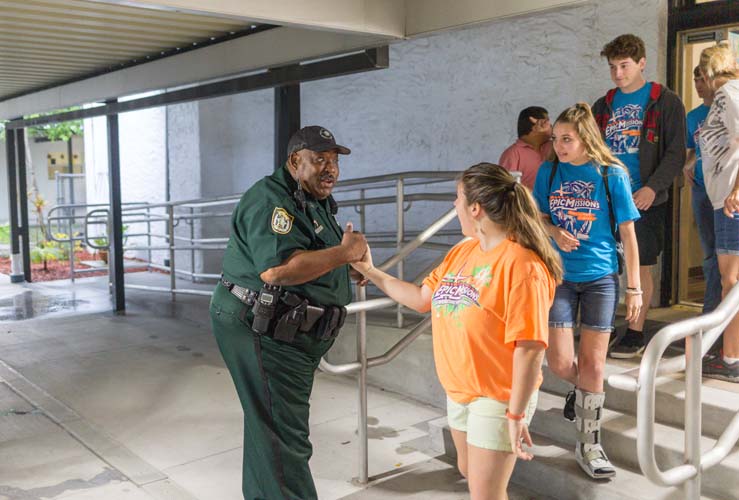
Sheriff Deryl Loar is asking for extra money in his 2018-19 budget to hire up to 15 new deputies to meet the state’s requirement that a law-enforcement officer be assigned to every public school.
In the wake of the Valentine’s Day mass shooting at Stoneman Douglas High School in Parkland, Gov. Rick Scott signed into law a bill that mandated the beefed-up security on school campuses.
To meet that demand, Loar was forced to temporarily reassign deputies to the School Resource Officer program for the remainder of the soon-to-end academic year – changes he said put a strain on the agency’s staffing and budget, since the School District covers only about half the cost of the additional manpower.
“It’s definitely been a challenge since March,” Sheriff’s Maj. Eric Flowers said. “We didn’t want to reduce our presence on the road, so we didn’t reassign anybody from our road patrol division. But it has impacted some of our specialty deputies.”
Flowers said deputies from other units – crime prevention, agriculture, marine and traffic, as well as background investigators – were temporarily reassigned to schools.
The Sheriff’s Office had one sergeant and 11 deputies assigned as SROs before the massacre in Parkland, where a former student killed 17 people and injured 17 others. Now, the agency has assigned one lieutenant, two sergeants and 25 deputies to local schools.
In addition, the Vero Beach and Sebastian police departments each provide three SROs, including one at St. Helen’s School.
Flowers said private schools cover 100 percent of the cost of their SROs.
The new security measures put SROs in all 16 public elementary schools, the Technical Center for Career and Adult Education, and the Wabasso School, as well as in the middle and high schools.
“Before Parkland, we had SROs at all the secondary schools – the middle schools and the high schools, excluding the charter school,” Flowers said. “Now, we’re at every school in the county.
“When the mandate came down from Tallahassee, we had to do something to get through the 40-something days of school that remained this year,” he added. “Somehow, we’ve made it work.”
Flowers said the Sheriff’s Office is planning to have full-time SROs on every campus, including two each at the high schools, when the new academic year begins in August.
The agency already has in-house job postings for the additional SRO positions, all of which are expected to be filled by current deputies.
The new hires Loar is hoping for would then fill the vacancies created by the deputies transferring to the schools.
“Getting the new SROs isn’t a problem,” Flowers said. “We were going to add two new SROs next year, anyway, and we have people who want to do those jobs. We just need to provide them with the additional training, so they’re ready to go when classes begin next school year.
“Then, though, we have to fill the positions they’re leaving, and that’s not a simple or quick process,” he continued. “It takes time to get somebody prepared for road patrol. You don’t just take someone fresh out of the academy and put them on the road. They have to go through field training, too.
“Plus, as in any law-enforcement agency, there’s always attrition,” he added. “You always have to replace people. So we’ll go full-throttle on hiring. But it’s going to take a while to have all the people we need to cover all the bases.”
It’s also going to take money.
Loar submitted his budget request to the county on May 1. County commissioners will conduct budget hearings in July and render a decision in September.
Under the new law, the Florida Legislature will provide more than $100 million to school districts around the state for additional SROs.
According to Carter Morrision, the county’s assistant schools superintendent for finance, the Indian River County School District will receive from the state just over $1 million to help fund the additional SROs here for the 2018-19 academic year.
Of that amount, however, the district must give nearly $150,000 to the local charter schools, leaving about $935,000 to cover the rest of the county schools – and Morrison projects a shortfall.
In fact, the district will be confronted with a deficit this year, too.
Morrison said the Sheriff’s Office has charged the district nearly $530,000 for police services in the schools but, after deducting the charter schools’ share of prior state-provided funding, the district has less than $370,000 to pay its SRO bill.
“The difference will have to be made up with local funds,” Morrison said, referring to tax revenues.
Even after the district pays its share, at least half of the costs of putting SROs in local schools will continue to come out of the sheriff’s budget.
“The state funding goes directly to the school districts, but that pays for only a portion of it,” Flowers said, “so it almost an unfunded mandate.”



